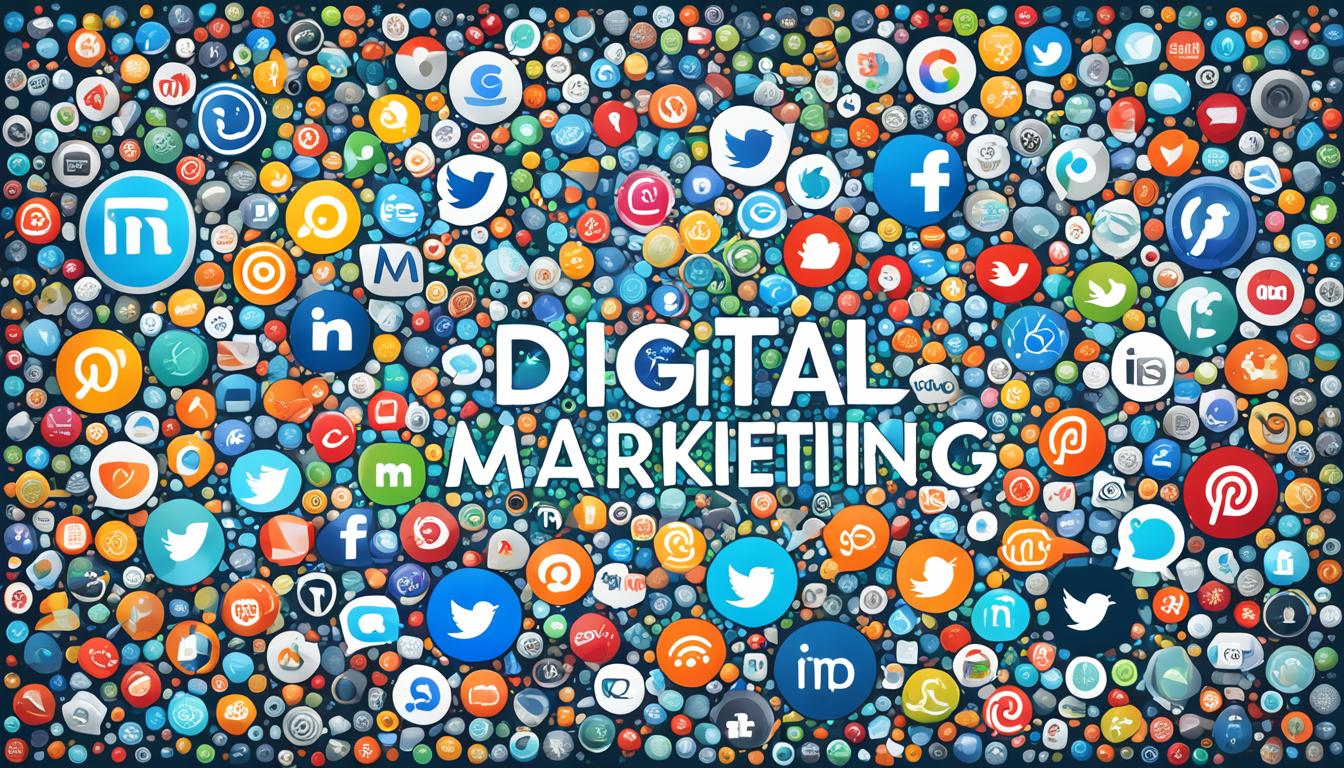Welcome to the world of digital marketing! In today’s digital era, having a strong online business presence is key to achieving growth and success. This is where a digital marketer comes into play.
A digital marketer is a skilled professional who specializes in leveraging various online channels and strategies to promote businesses, increase brand awareness, and drive customer engagement. They possess the knowledge and expertise to navigate the ever-evolving digital landscape and adapt strategies to keep up with the latest trends.
In this article, we will delve into the role and responsibilities of a digital marketer, exploring the skills and qualifications required. We’ll also discuss the importance of digital marketing for businesses and examine the various strategies and tools used by digital marketers. Lastly, we’ll touch on the challenges faced by these professionals and the exciting career opportunities available in the field of digital marketing.
So, whether you’re aspiring to become a digital marketer or simply looking to gain a better understanding of this dynamic field, read on to uncover the world of digital marketing and how it can propel businesses to new heights of success.
Key Takeaways
- A digital marketer plays a crucial role in enhancing the online presence of businesses and driving growth.
- Digital marketers leverage various online channels and strategies to promote businesses and increase brand awareness.
- Proficiency in digital marketing tools, analytical thinking, creativity, and strategic planning are essential skills for digital marketers.
- Digital marketing offers numerous benefits, including reaching a wider audience, improving brand visibility, increasing customer engagement, and driving higher conversion rates.
- Different digital marketing strategies such as SEO, content marketing, social media marketing, email marketing, and PPC advertising are used to achieve digital marketing goals.
What Does a Digital Marketer Do?
A digital marketer is responsible for various tasks and functions that contribute to the success of online businesses. Their expertise lies in leveraging digital channels to enhance brand visibility, attract potential customers, and drive growth. Let’s explore some of the key responsibilities of a digital marketer:
Managing Online Advertising Campaigns
One of the crucial responsibilities of a digital marketer is to create and manage online advertising campaigns. They utilize platforms like Google Ads or social media advertising to reach the target audience effectively. By strategically allocating advertising budgets and monitoring campaign performance, digital marketers optimize ads to maximize results.
Creating Engaging Content
A digital marketer plays a pivotal role in creating engaging and relevant content that resonates with the target audience. They develop content strategies, write blog posts, craft social media messages, and produce videos or infographics. By understanding the audience’s preferences, digital marketers craft compelling content to attract and retain customers.
Optimizing Websites
Another important responsibility is optimizing websites for better search engine visibility and user experience. Digital marketers conduct keyword research, implement on-page SEO techniques, and optimize website performance. They ensure that websites are mobile-friendly, load quickly, and provide a seamless browsing experience for visitors.
Analyzing Data and Implementing Strategies
Data analysis is a core skill of a digital marketer. They analyze marketing campaigns, website metrics, and customer behavior to derive actionable insights. Based on these insights, digital marketers refine marketing strategies, make data-driven decisions, and implement improvements to drive better results.
“Digital marketers are responsible for managing online advertising campaigns, creating engaging content, optimizing websites, and analyzing data to drive growth.”
In addition to these primary responsibilities, digital marketers also carry out tasks such as managing social media accounts, monitoring online reputation, conducting market research, and staying updated with the latest digital marketing trends and techniques. Their role is dynamic and continuously evolves as online consumer behavior and technology change.
As the digital landscape continues to grow and evolve, the role of a digital marketer remains essential in helping businesses establish a strong online presence and achieve their marketing objectives. By strategically implementing various marketing initiatives, digital marketers drive brand awareness, customer engagement, and ultimately contribute to business growth.
The Skills and Qualifications of a Digital Marketer
Being a successful digital marketer requires a diverse range of skills and qualifications that enable professionals to navigate the ever-evolving landscape of digital marketing. In order to excel in this field, digital marketers must possess a combination of technical expertise, creative thinking, and strategic planning abilities.
Key Skills for Digital Marketers
Analytical thinking: Digital marketers need to have a strong analytical mindset to gather and interpret data, analyze marketing campaigns, and draw actionable insights. The ability to identify trends and patterns in consumer behavior is crucial in shaping effective marketing strategies.
Creativity: In the digital marketing realm, creativity plays a vital role in capturing the attention of audiences. Digital marketers must be able to generate engaging content, design visually appealing graphics, and develop innovative strategies that resonate with target consumers.
Proficiency in digital marketing tools: To effectively execute digital marketing campaigns, digital marketers must be well-versed in utilizing various tools and technologies. These include social media management platforms, email marketing software, search engine optimization (SEO) tools, and web analytics platforms.
Strategic planning: Digital marketers must possess strong strategic planning skills to develop comprehensive marketing plans and campaigns. They should be able to set clear goals, identify target audiences, and create strategies that align with business objectives.
Understanding of online consumer behavior: A solid understanding of online consumer behavior is crucial for digital marketers to create targeted and personalized marketing campaigns. By analyzing consumer preferences and purchasing patterns, digital marketers can tailor their strategies to effectively reach and engage potential customers.
Qualifications for Digital Marketers
Educational background: While a degree in marketing, communications, or a related field can provide a solid foundation, digital marketing is a field where practical experience often carries significant weight. Many successful digital marketers have pursued certifications or completed specialized courses to gain in-depth knowledge of digital marketing strategies and tools.
Certifications: Industry-recognized certifications such as Google Ads, Google Analytics, HubSpot, and Facebook Blueprint can validate a digital marketer’s expertise and enhance their credibility. These certifications demonstrate proficiency in specific digital marketing areas and showcase a commitment to professional growth.
Continuous learning: Digital marketers must stay updated with the latest trends and best practices in the field. Attending industry conferences, networking with other professionals, and participating in online courses or workshops can help digital marketers stay ahead of the curve.
Experience: Practical experience in executing digital marketing campaigns is highly valued by employers. Demonstrating a track record of successful campaigns and the ability to deliver results can significantly enhance a digital marketer’s prospects in the job market.
By possessing a combination of these skills and qualifications, digital marketers can thrive in the fast-paced and dynamic world of digital marketing, driving growth and success for businesses.
The Importance of Digital Marketing
In today’s digital age, digital marketing has emerged as a crucial strategy that businesses must incorporate into their overall marketing plans. With the advent of technology and the internet, traditional marketing channels alone are no longer sufficient to reach and engage with a wider audience. Digital marketing offers numerous benefits that enhance brand visibility, drive customer engagement, and ultimately lead to higher conversion rates.
One of the key advantages of digital marketing is its ability to target a wider audience. Through various online platforms and channels, businesses can reach potential customers from different geographic locations. The ability to target specific demographics and interests allows for tailored messaging that resonates with the intended audience, increasing the chances of customer acquisition.
Moreover, digital marketing allows businesses to improve their brand visibility in a cost-effective manner. Through search engine optimization (SEO) techniques, businesses can enhance their website’s visibility on search engine results pages, driving organic traffic and increasing brand exposure. Additionally, social media marketing provides opportunities to engage with followers, sharing content and promotions that increase brand awareness.
“Digital marketing offers businesses the power to connect with a global audience, increasing their reach and opportunities for growth.”
Furthermore, customer engagement is a vital aspect of digital marketing. By utilizing various digital channels, businesses can interact with their target audience, fostering relationships and building brand loyalty. Through email marketing, personalized communication can be sent directly to the customer’s inbox, showcasing exclusive offers or tailored content that keeps them engaged and interested in the brand.
Lastly, digital marketing enables businesses to achieve higher conversion rates. By implementing effective strategies such as targeted advertising, persuasive copywriting, and optimized landing pages, businesses can guide potential customers through the buying process and increase the likelihood of conversions. The ability to track and analyze consumer behavior and campaign performance allows for constant optimization and improvement of marketing tactics.
Overall, the importance of digital marketing cannot be understated in today’s competitive business landscape. By harnessing the power of digital channels and strategies, businesses can improve their online presence, engage with their target audience, and achieve meaningful growth.
Digital Marketing Strategies
When it comes to digital marketing, implementing effective strategies is crucial for achieving success in the online landscape. Digital marketers utilize various strategies to optimize visibility, engage with their target audience, and drive conversions. Let’s explore some of the most prominent digital marketing strategies that professionals employ:
Search Engine Optimization (SEO)
SEO plays a pivotal role in improving a website’s ranking on search engine results pages. By optimizing website content, meta tags, and backlinks, digital marketers can increase organic traffic and visibility. Implementing SEO best practices ensures that businesses attract valuable, relevant traffic and increase their online presence.
Content Marketing
Content marketing focuses on creating high-quality and engaging content that provides value to the target audience. Blogs, articles, videos, infographics, and podcasts are some popular forms of content used. Digital marketers strategically distribute this content to attract, educate, and engage users, building brand trust and loyalty.
Social Media Marketing
Social media platforms such as Facebook, Instagram, Twitter, and LinkedIn have become powerful marketing channels. Digital marketers leverage these platforms to connect with their target audience, create brand awareness, and drive website traffic. Engaging posts, targeted advertising, and influencer partnerships help businesses reach their desired demographic.
Email Marketing
Email marketing remains an effective way for businesses to reach out to their audience directly. Digital marketers use well-crafted emails to share personalized content, product updates, special offers, and more. Automated email campaigns allow for efficient lead nurturing and customer retention.
Pay-Per-Click (PPC) Advertising
PPC advertising enables businesses to pay for ads displayed on search engine results pages or partner websites. Digital marketers create compelling ad campaigns and bid on specific keywords to drive targeted traffic to the website. PPC campaigns can be highly effective in generating leads and achieving immediate results.
By implementing a combination of these digital marketing strategies, businesses can enhance their online presence, attract more qualified leads, and ultimately drive conversions. A well-rounded and customized approach to digital marketing is essential in today’s dynamic digital landscape.

Tools and Technologies Used by Digital Marketers
As digital marketers navigate the ever-changing landscape of online marketing, they rely on a variety of tools and technologies to streamline their efforts and drive results. From data analysis to content creation, these tools empower digital marketers to optimize their strategies and deliver impactful campaigns. Let’s take a closer look at some of the essential tools and technologies used in the field.
Analytics Platforms
One of the fundamental aspects of successful digital marketing is data analysis. Web analytics platforms play a crucial role in helping digital marketers gain insights into website performance, user behavior, and the effectiveness of marketing campaigns. Popular analytics platforms like Google Analytics and Adobe Analytics provide in-depth metrics and reports that inform decision-making and optimization strategies.
Social Media Management Tools
Social media has become a cornerstone of digital marketing, making social media management tools an indispensable asset for digital marketers. These tools enable efficient scheduling, publishing, and monitoring of social media content across multiple platforms. With tools like Buffer and Hootsuite, digital marketers can save time, maintain a consistent brand presence, and engage with their audience effectively.
Email Marketing Software
Email marketing remains a powerful way for businesses to connect with their audience, and email marketing software simplifies the process for digital marketers. Platforms like Mailchimp and HubSpot offer user-friendly interfaces, automation capabilities, and advanced segmentation tools. These features empower digital marketers to deliver personalized and targeted email campaigns that drive engagement and conversions.
Content Management Systems
A robust content management system (CMS) is essential for digital marketers to efficiently manage and publish website content. Leading CMS platforms like WordPress and Drupal provide intuitive interfaces, customizable templates, and plugins that enhance website functionality. With these tools, digital marketers can create and optimize engaging content that aligns with their marketing objectives.
Advertising Platforms
To reach their target audience effectively, digital marketers leverage various advertising platforms. Platforms like Google Ads and Facebook Ads offer powerful targeting options, ad management tools, and analytics to track campaign performance. With these tools, digital marketers can create and optimize targeted advertising campaigns that drive traffic, conversions, and brand awareness.
By harnessing the power of these tools and technologies, digital marketers can effectively navigate the dynamic landscape of online marketing. Whether it’s analyzing data, managing social media, or delivering impactful campaigns, these tools empower digital marketers to enhance their strategies and achieve their marketing goals.
| Tool/Technology | Description |
|---|---|
| Web Analytics Platforms | Provides insights into website performance and campaign effectiveness |
| Social Media Management Tools | Facilitates efficient scheduling, publishing, and monitoring of social media content |
| Email Marketing Software | Enables personalized and targeted email campaigns |
| Content Management Systems | Streamlines website content management and publication |
| Advertising Platforms | Offers powerful targeting options and ad management tools |
Challenges Faced by Digital Marketers
Being a digital marketer comes with its fair share of unique challenges. In an ever-evolving digital landscape, staying ahead of the game is key to success. Let’s explore some of the common challenges faced by digital marketers and how they overcome them.
Keeping up with Evolving Trends
The digital marketing industry is constantly evolving, with new technologies, platforms, and strategies emerging regularly. Digital marketers must stay updated with the latest industry trends to remain competitive. This includes understanding shifts in consumer behavior, emerging social media platforms, and advancements in SEO algorithms. By continuously learning and adapting, digital marketers can effectively incorporate innovative strategies into their campaigns.
Managing Multiple Platforms
In today’s digital landscape, businesses need to maintain a presence on multiple platforms to reach their target audience. Digital marketers often face the challenge of managing and optimizing campaigns across various channels such as social media, search engines, email marketing, and content marketing. Balancing the diverse requirements of each platform while ensuring a consistent brand message is a delicate tightrope act.
Staying Up-to-Date with Algorithm Changes
Search engine algorithms are constantly changing to improve user experience and deliver accurate search results. These algorithm updates can significantly impact a digital marketer’s strategy, as they directly affect website visibility and organic rankings. Staying informed about these changes, adapting SEO techniques, and ensuring content complies with the latest best practices is imperative for success.
Effectively Measuring Campaign Success
Measuring the effectiveness of digital marketing campaigns is crucial for understanding what works and what needs improvement. However, with the abundance of data available, it can be challenging to determine which metrics to focus on and how to leverage them for actionable insights. Digital marketers need to establish clear goals, define relevant key performance indicators (KPIs), and use analytics tools to measure and interpret campaign success effectively.
Overcoming these challenges requires digital marketers to arm themselves with knowledge, adaptability, and a deep understanding of their target audience. By staying proactive, embracing change, and leveraging available resources, digital marketers can navigate these obstacles and drive successful digital marketing campaigns.

| Common Challenges Faced by Digital Marketers | Strategies to Overcome Challenges |
|---|---|
| Keeping up with evolving trends | Continuous learning and adapting to industry changes |
| Managing multiple platforms | Effective planning, prioritization, and automation tools |
| Staying up-to-date with algorithm changes | Regular monitoring, staying informed through industry resources |
| Effectively measuring campaign success | Establishing clear goals, defining relevant KPIs, leveraging analytics tools |
Career Opportunities in Digital Marketing
As the digital landscape continues to evolve, so do the career opportunities in digital marketing. This dynamic field offers a wide range of roles that cater to different skill sets and interests. Whether you are a creative individual or a data-driven strategist, there is a place for you in the world of digital marketing.
One of the prominent career paths is that of a digital marketing manager. In this role, you will be responsible for developing and implementing marketing strategies to promote products or services online, managing campaign budgets, and analyzing data to optimize performance.
If you have a passion for search engines and organic visibility, you may consider becoming an SEO specialist. As an SEO specialist, your main focus will be on improving website rankings, conducting keyword research, and optimizing website content to increase organic traffic and drive conversions.
For those who have a way with words and love creating engaging content, a career as a content creator may be the perfect fit. As a content creator, you will craft compelling blog posts, social media content, videos, and more, to attract and engage target audiences.
If social media is your forte, you might find success as a social media strategist. In this role, you will develop and implement social media campaigns, create engaging content, manage online communities, and leverage social media platforms to drive brand awareness and build customer loyalty.
For the analytically inclined, a career as a data analyst in digital marketing might be the perfect match. As a data analyst, you will collect and analyze data from various digital marketing campaigns, extract actionable insights, and make data-driven recommendations to optimize marketing strategies and drive business growth.
Overview of Digital Marketing Career Opportunities
| Role | Description |
|---|---|
| Digital Marketing Manager | Develop and implement marketing strategies, manage campaigns, and analyze data for optimization. |
| SEO Specialist | Improve website rankings, conduct keyword research, and optimize website content for organic traffic. |
| Content Creator | Create engaging content for blogs, social media platforms, videos, and other digital channels. |
| Social Media Strategist | Develop and implement social media campaigns, create content, and engage online communities. |
| Data Analyst | Analyze data from digital marketing campaigns, extract insights, and make data-driven recommendations. |
With digital marketing becoming increasingly essential for businesses of all sizes, the demand for skilled professionals in this field is on the rise. Whether you choose to work as an in-house marketer, for an agency, or as a freelancer, the opportunities are endless. So, if you have a passion for digital marketing, now is the time to explore these exciting career paths and pave your way to success in this ever-expanding industry.
Conclusion
In conclusion, digital marketers play a vital role in enhancing the online presence and driving growth for businesses. By managing online advertising campaigns, creating compelling content, optimizing websites, analyzing data, and implementing effective marketing strategies, digital marketers help businesses target a wider audience and improve brand visibility.
With their skills in using digital marketing tools, analytical thinking, creativity, strategic planning, and understanding of online consumer behavior, digital marketers are equipped to navigate the dynamic landscape of digital marketing and overcome challenges like evolving trends and algorithm changes.
Career opportunities in digital marketing are abundant, with roles such as digital marketing manager, SEO specialist, content creator, social media strategist, and data analyst offering exciting prospects for aspiring professionals.
As businesses continue to recognize the importance of digital marketing in today’s digital era, the demand for skilled digital marketers will only continue to grow. By harnessing the power of digital marketing strategies and leveraging tools and technologies, businesses can maximize their online presence and drive significant growth.
FAQ
What is a digital marketer?
A digital marketer is a professional responsible for enhancing the online business presence and driving growth through various digital marketing strategies and techniques.
What does a digital marketer do?
A digital marketer carries out tasks such as managing online advertising campaigns, creating content, optimizing websites, analyzing data, and implementing marketing strategies to promote businesses and engage with target audiences.
What are the skills and qualifications required to be a digital marketer?
To excel as a digital marketer, one needs skills such as proficiency in digital marketing tools, analytical thinking, creativity, strategic planning, and a solid understanding of online consumer behavior. Qualifications may vary, but a degree in marketing or a related field is often beneficial.
Why is digital marketing important?
Digital marketing has become crucial for businesses due to its ability to target a wider audience, improve brand visibility, increase customer engagement, and achieve higher conversion rates compared to traditional marketing methods.
What are some digital marketing strategies?
Digital marketing strategies include search engine optimization (SEO), content marketing, social media marketing, email marketing, and pay-per-click (PPC) advertising, among others.
What tools and technologies do digital marketers use?
Digital marketers use various tools and technologies such as web analytics platforms, social media management tools, email marketing software, content management systems, and advertising platforms to effectively carry out their marketing campaigns.
What are the common challenges faced by digital marketers?
Digital marketers often face challenges such as keeping up with evolving trends, managing multiple platforms, staying updated with algorithm changes, and accurately measuring the success of their campaigns.
What career opportunities are available in digital marketing?
Digital marketing offers various career opportunities, including roles such as digital marketing manager, SEO specialist, content creator, social media strategist, and data analyst, among others.
What is the significance of digital marketers?
Digital marketers play a crucial role in enhancing the online business presence and driving growth by implementing effective digital marketing strategies and techniques.















